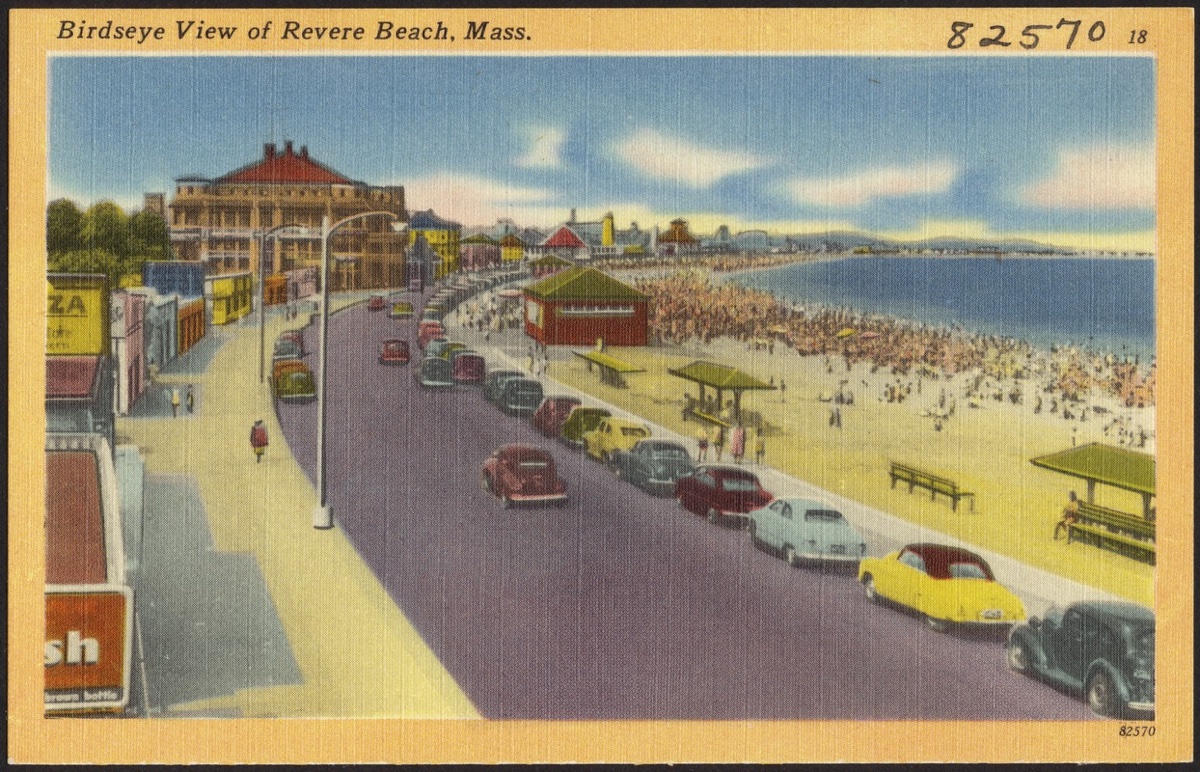In Defense of Revere Beach

Image via Digital Commonwealth
Listen, I get it. Some beaches are low-hanging fruit.
I grew up in New Jersey, and long before MTV loosed a pack of greasy-haired hominids upon Seaside Heights, we called the area “Sleazeside” and joked about emerging from the murky water with so many syringes, you’d look like a hedgehog. Everyone in the Garden State is acutely aware of the shore’s myriad shortcomings, but at the same time, perversely proud of it, and so very smug that no matter how much it whines, Pennsylvania will always be landlocked.
Revere Beach is different. I don’t get the hate.
Established in 1895 as the first public beach in America, Revere Beach is an egregiously under-appreciated treasure. It’s no coincidence it was designed by Cambridge’s Charles Eliot, the same guy who helped craft Franklin Park, the Fens, and the Arnold Arboretum.
“It is the crown jewel of the Boston region, and I tell everyone that,” Revere Mayor Brian Arrigo says. He grew up a few blocks from the beach and played basketball on the court behind Kelly’s Roast Beef, where he’d later polish off a clam plate, “a thing that only fourth-generation Revere kids can get.”
Revere Beach is accessible from three stops on the Blue Line’s northernly terminus, including Wonderland, named after the long-gone amusement park and immortalized in the 1998 rom-com Next Stop Wonderland. It is an incontrovertible fact that the Blue Line is the best the MBTA has to offer: eerily clean and sparsely populated, like a Market Basket during the strike. If anything, the trip to Revere Beach alone is worth the $2 and change just to hear Frank Oglesby, the stentorian voice of the MBTA, say something as whimsical as, Wonderland, doors will open on the right.
Back in the day, Revere Beach was home to two of the tallest and fastest roller coasters in the world. Built by Harry Traver, the Frederick Law Olmsted of roller coasters, the Cyclone and Lightning were dubbed “rib-ticklers” for all the violent thrashing, and “Take her on the Lightning” soon became a tongue-in-cheek Boston localism for terminating an unwanted pregnancy.
You think Wingaersheek has history like that? Please.
According to a 2015 report by Save the Harbor/Save the Bay, a Boston-based environmental advocacy group, the water at Revere Beach is not only safe, but even cleaner than Waikiki Beach in Honolulu and South Beach in Miami. I repeat: Revere Beach is cleaner than Waikiki. If I were Arrigo, I’d have that written in 50-foot, LED letters on the beachhead, visible from Nova Scotia.
And yet, the perception of a shoreline littered with needles and sludge unaccountably persists. I ask Arrigo if he ever tires of fighting against the current. “It’s not frustrating. It’s fun to give people an education about the beach,” he tells me. “I worked in the Legislature for a few years, and as you can imagine, there can be some snobby people in the State House.”
You don’t say.
“I would bring people down the beach, because everyone had their jokes about Revere,” he says. “So I would bring people down to Revere Beach, and everyone was always blown away. I had a couple thank-you cards that people gave me. They were blown away. Blown away that it was so clean, that it was so nice, and just a place that people could have a great time.”
I ask Boston photo editor Toan Trinh, the newsroom’s resident Revere authority, for a list of his favorite haunts, and what he spits out sounds like Bruce Springsteen and William S. Burroughs tried writing a Zagat’s guide: $10 cheese pies at Bianchi’s, double-scoops at Twist & Shake, the Shipwreck Lounge, Billy Tse’s, and the Banana Boat on Beach Street. (“But you gotta get a banana boat.”) On Shirley Avenue, which runs perpendicular to the beach, Arrigo says you can find some of the best Cambodian food around.
No, it’s not the Chatham Bars. You’d be hard-pressed to find a shred of Vineyard Vines for miles. And while a tuna crudo might be a little hard to come by, a roast beef sandwich from Kelly’s on a grilled, buttered bun is the most convincing argument short of Aquinas for the existence of a divine power. Revere Beach is a working-class paradise. As Boston gentrifies into sleek, luxury oblivion with ground-floor retail space, delights like Revere Beach become even more precious.


